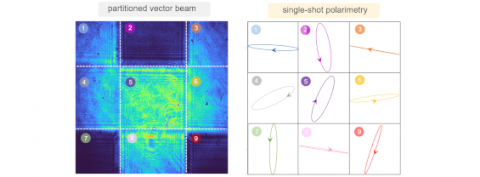Single-shot polarimetry of vector beams by supervised learning

A new method allows the measurement of the polarization of light in a single shot without requiring any polarization optics. The single-shot polarization camera exploits photonic machine learning and enables the use of polarization-structured light in communication, sensing, and computing.
Generating, manipulating, and detecting the polarization of light has crucial importance in many areas such as sensing, microscopy, and quantum information and computation. Complete determination of the state of polarization needs at least four individual measurements made with several polarization components such as polarizers and waveplates, a reason why current polarimeters are bulky, slow, and inapplicable in many contexts. The problem is even more critical for light with non-uniform polarization in the transverse plane, the so-called vector beams. Very recently, these polarization-structured beams have disclosed potential for ultra-sensitive metrology and noise-robust optical communication. However, their practical application is limited by the lack of methods for measuring many polarizations in a scalable and compact way.
In a study published in Nature Communications, Davide Pierangeli and Claudio Conti demonstrate compact single-shot polarimetry based on photonic machine learning. The method allows measuring the many polarization of vector beams in a single shot without polarization optics. The principle is to map the multiple polarizations into a complex spatial intensity distribution via light scattering and exploit supervised learning for extracting the hidden polarization information in a single measurement. Experiments with beams encoding up to nine polarizations not only show that machine-learning polarimetry gets the same accuracy as bulky polarimeters that use projective measurements, but also allow additional functionalities, such as identifying an unknown number of polarization modes, that are unattainable with conventional techniques.
The result shows that a simple disordered glass can operate as a smart polarization camera, shifting the current concept of polarization imaging. The machine-learning multi-polarimeter is fast, ultra-compact, and works with high precision at any wavelength. This new photonic tool opens the route for exploiting vector beams in widespread and important applications including biomedical imaging, optical communication and computing.
Reference:
Authors:
Davide Pierangeli, Institute for Complex Systems, CNR davide.pierangeli@roma1.infn.it
Claudio Conti, Physics Department, Sapienza claudio.conti@uniroma1.it
